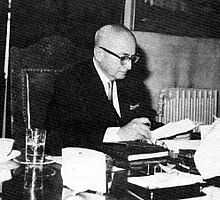Khalid al-Azm
| Khalid al-Azm خالد العظم |
|
|---|---|
 |
|
| Interim President of Syria | |
|
In office 4 April 1941 – 16 September 1941 |
|
| Preceded by | Bahij al-Khatib |
| Succeeded by | Taj al-Din al-Hasani |
| Prime Minister of Syria | |
|
In office 4 April 1941 – 21 September 1941 |
|
| Preceded by | Nasuhi al-Bukhari |
| Succeeded by | Hassan al-Hakim |
|
In office 16 December 1946 – 29 December 1946 |
|
| President | Shukri al-Quwatli |
| Preceded by | Saadallah al-Jabiri |
| Succeeded by | Jamil Mardam Bey |
|
In office 16 December 1948 – 30 March 1949 |
|
| President | Shukri al-Quwatli |
| Preceded by | Jamil Mardam Bey |
| Succeeded by | Husni al-Za'im |
|
In office 27 December 1949 – 4 June 1950 |
|
| President | Hashim al-Atassi |
| Preceded by | Nazim al-Kudsi |
| Succeeded by | Nazim al-Kudsi |
|
In office 27 March 1951 – 9 August 1951 |
|
| President | Hashim al-Atassi |
| Preceded by | Nazim al-Kudsi |
| Succeeded by | Hassan al-Hakim |
|
In office 17 September 1962 – 9 March 1963 |
|
| President | Nazim al-Kudsi |
| Preceded by | Bashir al-Azma |
| Succeeded by | Salah al-Din Bitar |
| Personal details | |
| Born | 1903 Damascus, Ottoman Syria |
| Died | 18 November 1965 (aged 62) Beirut, Lebanon |
| Political party | Independent |
| Religion | Sunni Islam |
Khalid al-Azm (Arabic: خالد العظم ; 1903 – 18 November 1965) was a Syrian national leader and six-time Prime Minister, as well as Acting President (4 April – 16 September 1941). He was a member of one of the most prominent political families in Syria, al-Azm (also known as Alazem or Al Azem), and the son of an Ottoman minister of religious affairs.
He graduated from the University of Damascus in 1923 with a degree in law, and joined the city government in 1925. At this time he also actively ran his family's estates throughout the country. In the 1930s, he became close associates with leading members of the anti-French National Bloc coalition such as future presidents Hashim al-Atassi and Shukri al-Kuwatli. He remained a longtime supporter of the former, but often quarreled with the latter, whom he accused of being too authoritarian. In 1941 the French appointed him Prime Minister and Acting President, having had no success in finding a viable candidate since the resignation of the nationalist Atassi in 1939. However he was replaced 5 months later with a French loyalist, Taj al-Din al-Hasani. Azm served repeatedly in parliament and in the cabinet from 1943 to 1947. He became a focus of opposition when he resigned from the cabinet in 1945 and lead the forces opposed to Kuwatli's drive to amend the constitution to allow himself a second term in office. Kuwatli prevailed, and Azm ran against him in 1947 and lost. However he accepted the position of envoy to France and served in that capacity for a year. He concluded successful arms purchases from France and later from the Soviet Union. In May 1948, Azm agreed to form a multi-party cabinet under Kuwatli which served until March 1949. He allied himself with France and the United States and attempted to obtain loans from them for domestic development. He traveled frequently to attend United Nations assemblies on the Palestinian problem. Azm clashed with members of the military, especially Chief of Staff Husni al-Za'im. The latter launched a Coup d'état on 29 March 1949 and imprisoned both Azm and president Kuwatli. When Za'im was overthrown five months later, Azm returned to parliament as deputy for Damascus and became minister of finance. He was also elected into the Constituent Assembly that drafted a new constitution for Syria. He became Prime Minister again under Hashim al-Atassi's second administration, in June 1950, heading three cabinets between then and 1951. Azm closed the border to Lebanese goods in an attempt to prevent the crash of domestic Syrian industry due to rampant Lebanese imports. He also clashed repeatedly with the military because he refused to appoint officers in any of his cabinets, and always reserved the defense portfolio for himself. He also clashed with pro-Hashemite elements in Syrian politics that advocated union with Iraq. Socialists distrusted him because of his aristocratic and wealthy Ottoman background. Azm left the public arena from 1951 to 1954 in protest over the coup of Adib al-Shishakli which toppled Atassi's democratic administration.
...
Wikipedia
